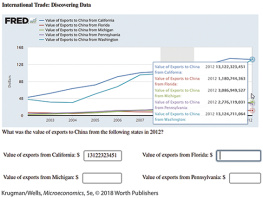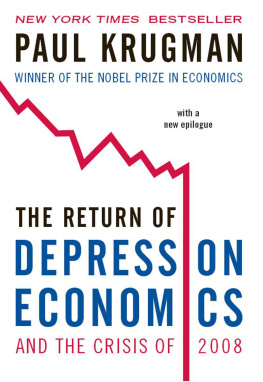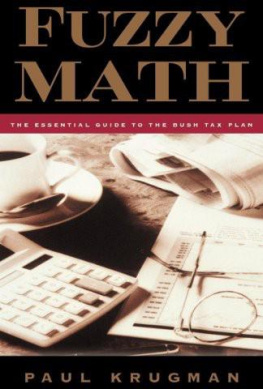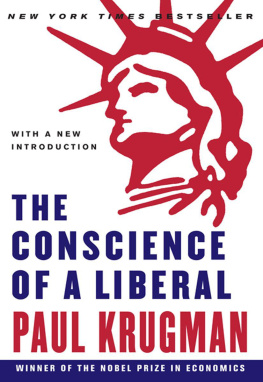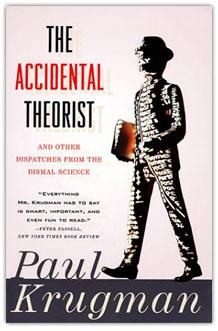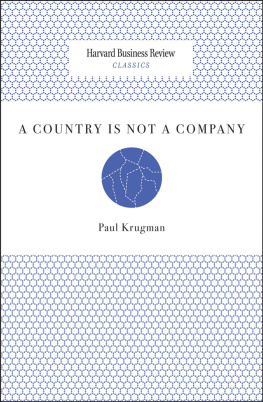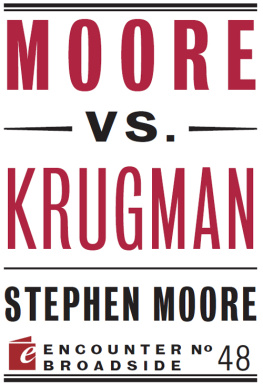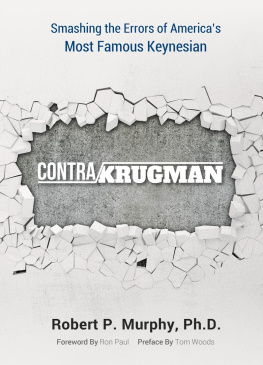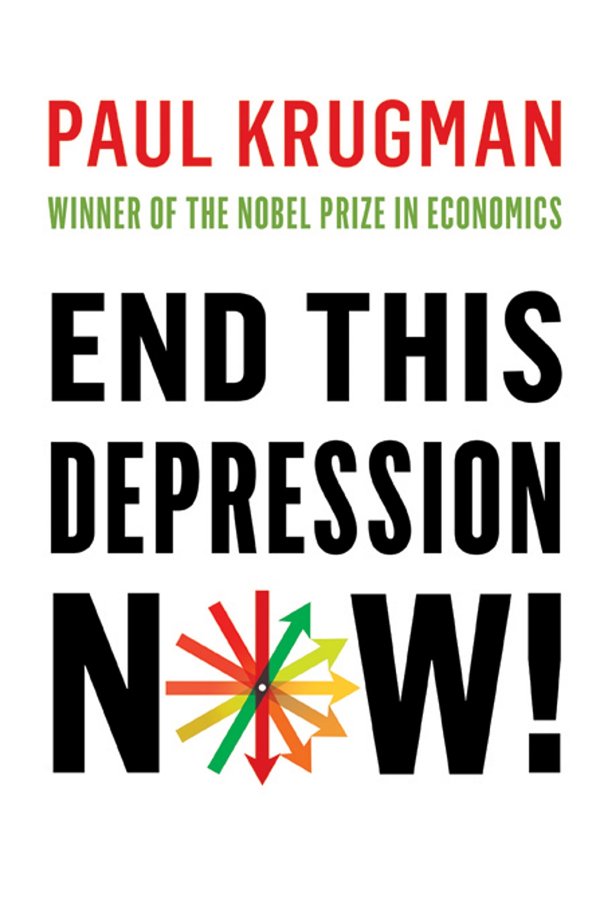
Also by Paul Krugman
The Return of Depression Economics and the Crisis of 2008
The Conscience of a Liberal
Fuzzy Math
The Accidental Theorist
Pop Internationalism
Peddling Prosperity
The Age of Diminished Expectations
PAUL KRUGMAN
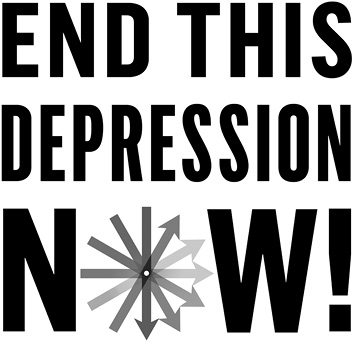

W. W. NORTON & COMPANY
NEW YORK LONDON
To the unemployed, who deserve better.
CONTENTS
INTRODUCTION
WHAT DO WE DO NOW?
T HIS IS A BOOK about the economic slump now afflicting the United States and many other countriesa slump that has now entered its fifth year and that shows no signs of ending anytime soon. Needless to say, many books about the financial crisis of 2008, which marked the beginning of the slump, have already been published, and many more are no doubt in the pipeline. But this book is, I believe, different from most of those other books, because it tries to answer a different question. For the most part, the mushrooming literature on our economic disaster asks, How did this happen? My question, instead, is What do we do now?
Obviously these are somewhat related questions, but they are by no means identical. Knowing what causes heart attacks is not at all the same thing as knowing how to treat them; the same is true of economic crises. And right now the question of treatment should be what concerns us most. Every time I read some academic or opinion article discussing what we should be doing to prevent future financial crisesand I read many such articlesI get a bit impatient. Yes, its a worthy question, but since we have yet to recover from the last crisis, shouldnt achieving recovery be our first priority?
For we are still very much living in the shadow of the economic catastrophe that struck both Europe and the United States four years ago. Gross domestic product, which normally grows a couple of percent a year, is barely above its precrisis peak even in countries that have seen a relatively strong recovery, and it is down by double digits in several European nations. Meanwhile, unemployment on both sides of the Atlantic remains at levels that would have seemed inconceivable before the crisis.
The best way to think about this continued slump, Id argue, is to accept the fact that were in a depression. No, its not the Great Depression, at least not for most of us (but talk to the Greeks, the Irish, or even the Spaniards, who have 23 percent unemploymentand almost 50 percent unemployment among the young). But its nonetheless essentially the same kind of situation that John Maynard Keynes described in the 1930s: a chronic condition of subnormal activity for a considerable period without any marked tendency either towards recovery or towards complete collapse.
And thats not an acceptable condition. There are some economists and policy officials who seem satisfied with avoiding complete collapse; but the reality is that this chronic condition of subnormal activity, reflected above all in a lack of jobs, is inflicting enormous, cumulative human damage.
So its extremely important that we take action to promote a real, full recovery. And heres the thing: we know how to do that, or at least we should know how to do that. We are suffering woes that, for all the differences in detail that come with seventy-five years of economic, technological, and social change, are recognizably similar to those of the 1930s. And we know what policy makers should have been doing then, both from the contemporary analysis of Keynes and others and from much subsequent research and analysis. That same analysis tells us what we should be doing in our current predicament.
Unfortunately, were not using the knowledge we have, because too many people who matterpoliticians, public officials, and the broader class of writers and talkers who define conventional wisdomhave, for a variety of reasons, chosen to forget the lessons of history and the conclusions of several generations worth of economic analysis, replacing that hard-won knowledge with ideologically and politically convenient prejudices. Above all, conventional wisdom among what some of us have taken to referring to, sarcastically, as Very Serious People has completely thrown away Keyness central dictum: The boom, not the slump, is the time for austerity. Now is the time for the government to spend more, not less, until the private sector is ready to carry the economy forward againyet job-destroying austerity policies have instead become the rule.
This book, then, attempts to break the hold of that destructive conventional wisdom and to make the case for the expansionary, job-creating policies we should have been following all along. To make that case I need to present evidence; yes, this book has charts in it. But I hope that this doesnt make it seem technical, or keep it from being accessible to intelligent lay readers, even if economics is not their usual thing. For what Im trying to do here is, in effect, to go over the heads of the Serious People who have, for whatever reason, taken all of us down the wrong path, at immense cost to our economies and our societies, and to appeal to informed public opinion in an effort to get us doing the right thing instead.
Maybe, just maybe, our economies will be on a rapid path to true recovery by the time this book reaches the shelves, and this appeal wont be necessary. I surely hope sobut I very much doubt it. Instead, all indications are that the economy will remain weak for a very long time unless our policy makers change course. And my aim here is to bring pressure, by means of an informed public, to get that course change, and bring an end to this depression.
CHAPTER ONE
HOW BAD THINGS ARE
I think as those green shoots begin to appear in different markets and as some confidence begins to come back that will begin the positive dynamic that brings our economy back.
Do you see green shoots?
I do. I do see green shoots.
Ben Bernanke, chairman of the Federal Reserve,
interviewed by 60 Minutes , March 15, 2009
IN MARCH 2009 Ben Bernanke, normally neither the most cheerful nor the most poetic of men, waxed optimistic about the economic prospect. After the fall of Lehman Brothers six months earlier, America had entered a terrifying economic nosedive. But appearing on the TV show 60 Minutes , the Fed chairman declared that spring was at hand.
His remarks immediately became famous, not least because they bore an eerie resemblance to the words of Chance, aka Chauncey Gardiner, the simpleminded gardener mistaken for a wise man in the movie Being There . In one scene Chance, asked to comment on economic policy, assures the president, As long as the roots are not severed, all is well and all will be well in the garden.... There will be growth in the spring. Despite the jokes, however, Bernankes optimism was widely shared. And at the end of 2009 Time declared Bernanke its Person of the Year.
Unfortunately, all was not well in the garden, and the promised growth never came.
To be fair, Bernanke was right that the crisis was easing. The panic that had gripped financial markets was ebbing, and the economys plunge was slowing. According to the official scorekeepers at the National Bureau of Economic Research, the so-called Great Recession that started in December 2007 ended in June 2009, and recovery began. But if it was a recovery, it was one that did little to help most Americans. Jobs remained scarce; more and more families depleted their savings, lost their homes, and, worst of all, lost hope. True, the unemployment rate is down from the peak it reached in October 2009. But progress has come at a snails pace; were still waiting, after all these years, for that positive dynamic Bernanke talked about to make an appearance.
Next page

